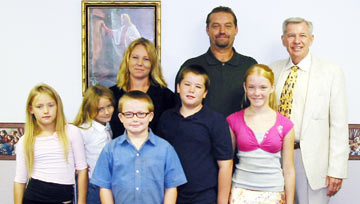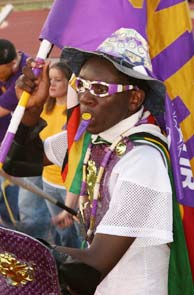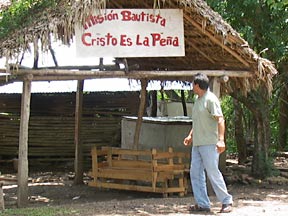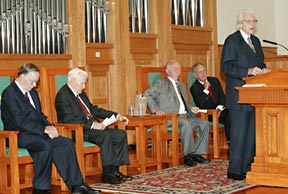Posted: 10/27/06
|
| Mobberly Church’s Elevation building has been named Metal Architecture magazine’s 2006 winner in the interior category in its annual design awards competition. The Longview church’s 26,000-square-foot Elevation building was constructed to reach the youth of the community. It includes classrooms, informal gathering areas, a cafe, a covered outdoor sport court and a large meeting room, complete with stage and seating for 600 people, that already has become a popular venue for concerts and worship services. The building was designed by Fitzpatrick.Butler Architects. |
Around the State
• Baylor University’s Hankamer School of Business will host a business ethics forum titled “Five Years Later: Leadership Lessons from Enron and Andersen” Nov. 1-3. The forum will begin Wednesday at 3:30 p.m. with a panel discussion, and events will continue through Friday afternoon.
• The annual Miss Mary Hardin-Baylor Pageant will be held Nov. 3-4 at 7 p.m. This year’s theme is “Rock the Runway.” Friday evening will be the talent competition, with Saturday featuring the evening gown and interview portion. General admission is $10 for both nights or $7 for one night.
• Tye Newkirk has been named director of student activities at East Texas Baptist University.
• Rebecca O’Banion has been named director of alumni relations at the University of Mary Hardin-Baylor. She is a 1993 graduate of the school and current president of the alumni association.
• Debra Berry, associate professor of nursing at Houston Baptist University, has been presented the Christa McAuliffe In Search of Excellence award by the Houston West Chamber of Commerce. David Capes, professor of Christianity, also was a nominee for the honor.
 |
| The congregation at Rainbow Church in Rainbow recently witnessed the baptism of all seven members of the Drake Family—Frank, father; Shannon, mother; and children, Andrea, Christopher, Franchesca, Bethany and Justice. The family is unique in Rainbow because it includes two sets of twins. At the time of the family’s baptism, Pastor Clyde Somers had baptized 14 people this year. |
• Howard Payne University has added three honorees to its Sports Hall of Fame. New inductees include B.J. Korenek, a four-year starter on the Yellowjacket football team, who played running back, quarterback, defensive back, kicker and punter; Bobby Robbins, a three-year starter on the football team, who played fullback and center; and Terry Cosby, who played tight end and kicker for the football team, but made his mark as a track-and-field athlete participating in the shot-put and discus—winning the conference championship for the shot-put in 1976 and 1977 and for the discus in 1977.
• Michael Morrison has been named director of Baylor University’s Center of Inter-national Education, effective Feb. 1. Morrison joined the Baylor Law School faculty in 1977 and was designated an outstanding professor in 1997. He takes the post of William Mitchell, who has led the center since 2000. Under Mitchell’s leadership, the number of students studying abroad has increased from 575 to 855, and the number of exchange and study-abroad programs has expanded to nearly 60 in 26 countries. The diversity of international students studying at Baylor increased to 76 home countries.
• Loretta McBeath, a member of North Park Church has been named lay person of the year by Abilene Association. Southwest Park Church was named church of the year. Lee Fuller of Wylie Church was named pastor of the year for larger congregations and association moderator for the coming year. Greg Clemmer of Cowboy Heritage Church was named pastor of the year for smaller congregations. Vernon Ferguson, minister of missions at Broadview Church, was named the outstanding staff member.
Anniversaries
• Primera Iglesia in Corpus Christi, 95th, Oct. 28. Rolando DeLeon is pastor.
• Shiloh Church near Mexia, 125th, Oct. 29. Baptist General Convention of Texas Executive Director Charles Wade brought the morning message. Doyle Purifoy is pastor.
• Bell Avenue Church in Amarillo, 40th, Oct. 29. Charter members Gene Massey, L.R. Mitchell and Marilyn Hooten were recognized. Danny Logan is pastor.
• West End Church in Houston, 100th, Oct. 29. Family members of seven pastors, including the first pastor, R.R. Burr, were present. Curtis Freeman, former pastor and current director of the Baptist House of Studies at Duke Divinity School, was the guest speaker. Michael Quintanilla is pastor.
• First Church in Athens, 150th, Nov. 5. Former Pastor James Bond will speak in the 8:30 a.m. service followed by a combined celebration. At 10:45 a.m., a contemporary worship service will be held. People who attend the first service will have lunch at 10:50 a.m., while those attending the second service will eat at noon. Kyle Henderson is pastor.
• Friendship Church in Beeville, 100th, Dec. 3. Former Pastor David Brumbelow will preach in the morning service. Vernon Helgren is pastor.
Deaths
• Rodney Thomas, 42, Aug. 22 at Fort Hood. Thomas, a Baptist General Convention of Texas-endorsed chaplain, died of a heart attack shortly after returning from service in Kuwait. In his military career, he served two tours of duty in relation to Operation Iraqi Freedom and one tour of duty in South Korea. He earned the Bronze Star, Army Commen-dation Medal, Army Achieve-ment Medal, National Defense Service Medal and Global War on Terrorism Service Medal. During his last tour of duty, he served a group of 1,200 soldiers and airmen as battalion chaplain. He logged more than 12,000 miles visiting troops throughout Iraq, and he prayed with every convoy that left Kuwait for Iraq. Thomas entered active military service in 2001 after serving nine years as pastor of First Church in Mullin. He was a member of First Church in Goldthwaite. He is survived by his wife, Lori; father, Jack; and brother, Ronald.
• Benny Anderson, 72, Sept. 18 in New Boston. He was a Baptist minister. At the time of his death, he was a member of Calvary Church in Simms. He is survived by his wife, Mackie; daughters, Rhonda Gerrald and Lisa Barron; brothers, Kenneth, Arlon and Avon; sister, Dorthy Monroe; and five grandchildren.
• Curtis Mathis, 78, Oct. 14 in Athens. He was ordained to the ministry by Second Church in Houston in 1949. While attending Baylor University, he was pastor of First Church in Tehuacana, and he was pastor of First Church in Tioga while attending Southwestern Semin-ary. After graduation, he was pastor of First Church in Old Ocean, Central Church in Jonesboro, Ark., First Church in Athens from 1966 to 1978, Calvary Church in Beaumont and First Church in Harrison, Ark. In 1988, he entered full-time evangelism and moved to Athens. He conducted revivals in Texas, Arkansas, Tennessee, Mississippi, Missouri, Oklahoma, California, Louisana, Korea, Scotland, Japan and Venezuela. He also was pastor/teacher for several senior adult camps at Highland Lakes Encampment. He was interim pastor of seven East Texas churches. He is survived by his wife of 56 years, Anna; mother, Elsie; son, Curtis Jr.; daughter, Cynthia Ann Mathis; two grandsons; and one great-granddaughter.
Events
• The contemporary Christian band SonicFlood will perform at Wedgwood Church in Fort Worth Nov. 4 and at Houston Baptist University Nov. 6. For more information, go to sonicflood.com.
• The B.H. Carroll Theological Institute will hold a luncheon during the Baptist General Convention of Texas annual meeting in Dallas Nov. 13. Tickets for the luncheon can be ordered at nexus.bhcti.org/catalog.
• First Church in McKinney will hold a three-day seminar for Christian leaders, authors and speakers Nov. 13-15. Florence and Marita Littauer will be the featured speakers for the seminar designed to give confidence and comfort to anyone who stands in front of a crowd. For more information, call (972) 562-7447.
• The North Central Chapter of the Singing Men of Texas will present a concert at First Church in Saginaw Nov. 16 at 7 p.m. Danny Howe is pastor.
• A Turning Hearts event for parents and teens desiring to grow closer will be held Nov. 17-18 at First Church in Lubbock. The event is divided into three segments—forgiving, living and turning. For more information, go to www.lifeway .com/turninghearts/about.asp.
• Inglewood Church in Grand Prairie has renamed its residence for furloughing missionaries to honor the 37 years of service by missionaries Don and Nita Jones. The couple began serving in Korea in 1957. The Joneses lived in the missionary house in 1989-90, and returned to Grand Prairie upon retirement. She died in 2004, but he remains a member there. Shawn Barnard is pastor.
News of religion, faith, missions, Bible study and Christian ministry among Texas Baptist churches, in the BGCT, the Southern Baptist Convention ( SBC ) and around the world.




